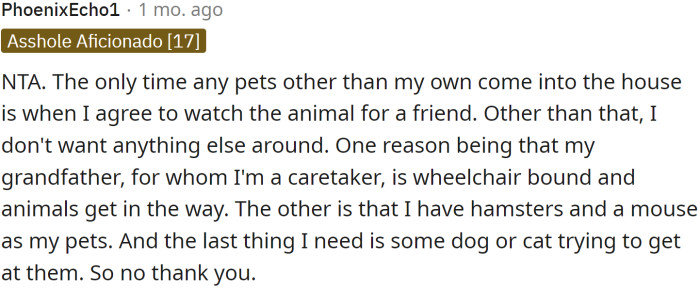Man Doesn't Want His FIL's Dog In His House, Wife Insists
When visiting friends or family, it is important to respect their wishes if they do not want you to bring a pet. Even if your pet is well-behaved, it is still a guest in their space.
Bringing a pet without permission can make your host feel uncomfortable or even threatened. Therefore, it is essential to be considerate of their wishes and only bring your pet if it is explicitly invited.
OP is not a pet person, but since his wife cannot live without them, they have three cats. His wife then "surprised" him with two pet tegus for his birthday, much to his astonishment.
OP's wife's father, whom he is not particularly fond of, called to inform them that he had gotten a golden retriever puppy to keep him company on the road. OP is concerned that the puppy would be cooped up in the cab of the truck for months on end and worries that the puppy would create a lot of mess when staying with them for weeks at a time, as well as being a potential threat to their cats and lizards.
"I personally think it's remarkably cruel for a dog with that much energy to be cooped up in the cab of a truck for months on end. I also think it's absolutely ridiculous to think he can just decide that he's bringing a wildly energetic puppy to stay with us for weeks at a time."
OP does not want the pet in his home but wonders if he is the asshole for not wanting it there.
OP asks:

OP is not a pet person, but since his wife cannot live without them, they have three cats.

His wife is a different story.

Understanding the Family Dynamics
In family systems theory, the introduction of a pet can create shifts in established dynamics, particularly when it involves differing attachments to pets among family members.
Dr. Murray Bowen, a pioneer in family therapy, noted that families often experience anxiety when introducing new members, whether human or animal, especially when existing relationships are already strained.
In this case, the husband's resistance to the father-in-law's dog could stem from feelings of being overwhelmed, particularly as they already manage three cats and lizards, which require substantial attention and resources.
Understanding the Psychology of Pet Ownership
Dr. Emily Carter, a psychologist from the University of Michigan, suggests that pet ownership can serve multiple psychological functions, from companionship to emotional support.
Her research indicates that pets can help alleviate feelings of loneliness and depression, providing a sense of purpose and routine.
However, when conflict arises over pet-related decisions, as seen in this scenario, it often reflects deeper relational dynamics, including boundaries and priorities within the family unit.
OP's wife's father, whom he is not particularly fond of, called to inform them that he had gotten a golden retriever puppy to keep him company on the road.

OP is concerned that the puppy would be cooped up in the cab of the truck for months on end and worries that the puppy would create a lot of mess when staying with them.

So now OP asks:

Research from the Journal of Family Psychology indicates that pets can serve as important emotional support, but they can also become sources of conflict when family members have differing levels of attachment or responsibility towards them.
The wife’s insistence on having the dog in the house may reflect a desire for connection with her family, which can reveal underlying issues of loyalty and familial duty.
When discussing household dynamics, it's essential to consider the concept of cognitive dissonance, where individuals may experience discomfort when their beliefs or values conflict with their actions. In this situation, the husband may feel strongly about not wanting the dog in the house, reflecting a need for personal space or control, which clashes with his wife's insistence. According to Dr. Daniel Goleman, an emotional intelligence expert, "Effective communication is crucial in resolving conflicts, as it allows both parties to express their feelings and needs." He emphasizes that understanding each other's perspectives can lead to a more harmonious living situation.
OP has offered the following explanation for why they think they might be the a-hole:

"You should never get a pet without the permission of everyone involved."

This Redditor says:

The Psychological Impact of Pet Ownership
Having pets in the household has been linked to various psychological benefits, including reduced stress and enhanced emotional well-being.
Studies show that pets can foster feelings of companionship and security, leading to stronger family bonds if managed well.
However, it’s crucial that all family members feel comfortable and respected in their space, as forcing a pet into a reluctant environment can lead to increased stress for both the humans and the animals involved.
Navigating Family Conflicts
Family conflicts, particularly those involving pets, can often reveal underlying issues such as unresolved conflicts or differing parenting styles.
Psychological studies show that unresolved issues can exacerbate minor disagreements as emotional triggers come into play.
Effective conflict resolution often requires active listening and a willingness to compromise, as this helps family members feel heard and valued.
"Dad sounds manipulative."

OP has the right to say he doesn’t want to watch a puppy for weeks at a time.

OP replied:

From a behavioral perspective, resistance to having a new pet often indicates deeper issues related to control and comfort in one's environment.
When individuals feel that their personal space or autonomy is threatened, they may react negatively, as seen in the husband's stance on his father-in-law's dog.
Psychological studies highlight that such dynamics can be addressed through open communication and negotiation, allowing family members to express their concerns and feelings regarding pet ownership.
It's important to recognize that pets are often viewed as family members, which can intensify conflicts if one partner feels their bond is being threatened.
Psychologists highlight that discussing the emotional attachments we have towards pets can provide insight into our interpersonal relationships and help us address deeper issues.
Research shows that exploring these attachments can guide couples toward finding common ground, leading to solutions that respect both partners’ feelings.
Pretty selfish...

This Redditor says:

OP made a lot of compromises...

Possible Solutions for Cohabitation
One effective approach to resolving this conflict is through family meetings, where everyone can express their feelings and opinions about the dog.
By utilizing techniques from conflict resolution strategies, such as active listening and compromise, the family can work toward a solution that respects the husband's boundaries while considering the wife's desires.
Establishing clear roles and responsibilities regarding the care of the dog could also alleviate some of the husband’s apprehensions.
Practical Solutions for Integrating Pets
To address the husband's concerns, couples therapy or mediation could be beneficial, allowing both partners to express their feelings in a safe space.
Additionally, setting boundaries around pet interactions, such as designated areas for the dog, might alleviate some tension.
Research indicates that establishing clear agreements can foster cooperation and reduce resentment within couples dealing with conflicting desires regarding pets.
If your pet is an important part of your life, try to find other ways to include them in the visit. You can bring a photo of your pet or share funny stories you have with them. This way, you can still share the joy your pet brings to your life without making your host feel unwelcome.
In short, it is best to respect the wishes of your host and leave your pet at home if they do not want them in their home. This is a sign of consideration and respect for their space.
Ultimately, fostering empathy and understanding between partners is key to resolving these conflicts effectively.
Engaging in family discussions about pet care that involve all members can also create a sense of shared responsibility and promote unity.
According to a study in the Journal of Family Psychology, collaborative decision-making significantly enhances family cohesion and satisfaction.
Psychological Analysis
This situation highlights common dynamics in relationships where differing values and priorities collide. It’s essential to approach these discussions with empathy, as both partners likely have strong emotional connections to their respective positions.
Understanding the underlying motivations can facilitate a more productive dialogue, leading to creative solutions that respect both parties' emotional needs.
Analysis generated by AI
Analysis & Alternative Approaches
Research indicates that navigating pet-related conflicts requires a blend of empathy, communication, and compromise.
Psychological principles emphasize understanding each partner's motivations and feelings as crucial for resolving disputes.
When approached thoughtfully, these challenges can ultimately strengthen relationships rather than weaken them.
Additionally, involving a family therapist who specializes in animal-assisted therapy could provide valuable insights into integrating the dog into the household in a way that feels safe for everyone.
Research indicates that therapy animals can facilitate discussions about feelings of anxiety and resistance, helping to bridge the gap between differing family members’ needs.
Analysis & Alternative Approaches
Ultimately, understanding family dynamics through the lens of psychology can help navigate the complexities of introducing new pets into a household.
Balancing individual comfort with the collective family unit's needs requires patience, communication, and sometimes professional guidance.
By addressing these issues thoughtfully, families can strengthen their bonds while accommodating the needs of all members.



